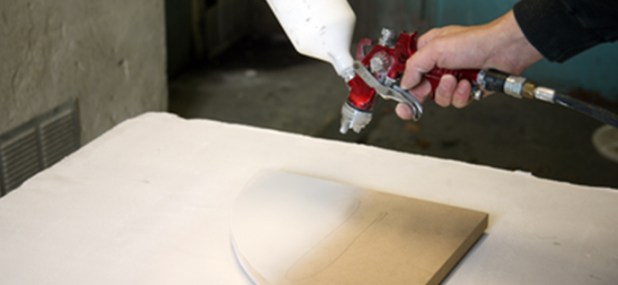Using a spray paint gun on your walls may sound intimidating, but it’s actually really simple.
Here are the steps to painting with a spray gun.
Prep the surface
The surface you’ll be using your spray paint on must be cleaned and clear of anything else.
Degrease the area with some water, and even detergent if needed. Spray painting will propel paint in the form of droplets. The final result will be uncertain if this first step isn’t performed adequately.

Protect the environment
Like with any other paint jobs, you need to protect everything around the area. Put down a tarp on the ground.
If you’re painting a portable object, bring it outside. If the object is placed against a wall, install some cardboard in front to protect it.
Dilute the paint
Before filling your gun, you need to dilute the paint to make it fluid.
Depending on the type of paint used, dilute it with water or white spirit. Check the instructions given by your product’s manufacturer.

Check the texture
Make sure everything will spray properly by testing your gun, and the paint’s texture, prior to applying it on your wall.
Use a piece of cardboard, for example. The mix needs to be just right.
Paint has a maximum degree of dilution, varying depending on what kind. Once again, check the info given by the manufacturer.
Adapt the nozzle
Once you’ve checked the accurate texture of your paint, change the nozzle depending on the result.
For thicker paint, use a wide spray nozzle.
For liquid paint, use a finer nozzle diameter.
Your paint’s hold will be determined by the choice of nozzle for your gun, so make sure to pick the right one. Then, fill your spray gun with the paint.

Apply the paint
Hold your gun about ten inches away from the surface. Keep it vertical and on low pressure.
Make regular slow movements, parallel to the surface to be painted on. Two coats of paint should overlap.
Visualize large squares to fill out and work in batches. Once you’ve painted the first square, overlap it with the second.
Don’t try to spray paint while your gun is off. You’ll ruin the paint and the thickness.
Drain the nozzle and gun occasionally.
Clean everything once you’ve emptied out the paint. Flush all the circuits. Clean the nozzle carefully with a brush.
Be careful with the drying time of your paint.
 Groomed Home Smarter Living
Groomed Home Smarter Living




